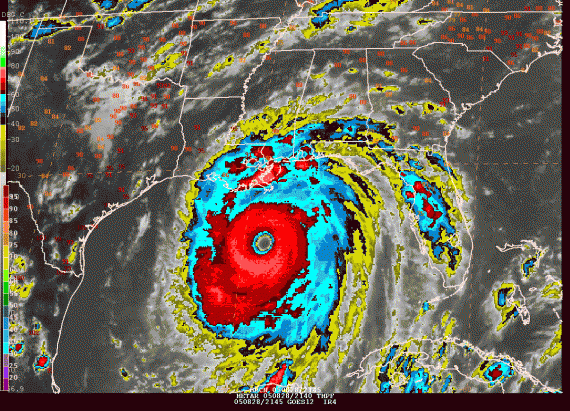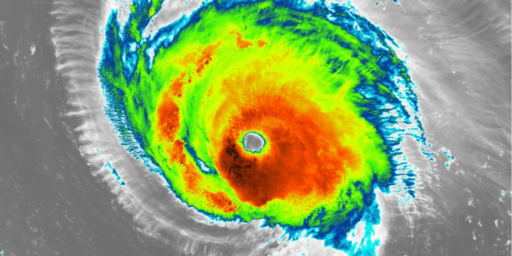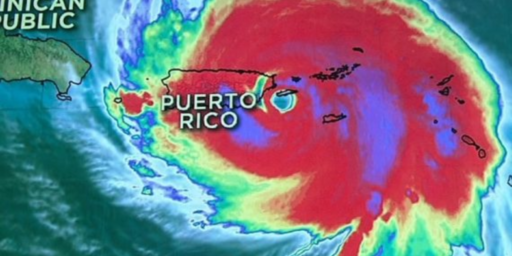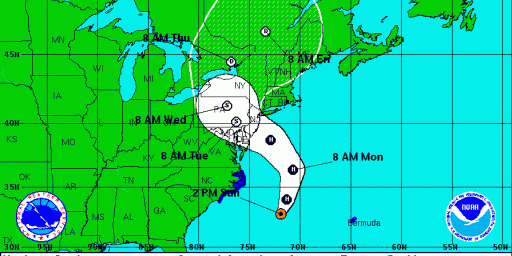Hurricanes With Female Names More Likely To Kill People
A new study claims that hurricanes with female names tend to kill more people because people don’t take warnings about them seriously:
People don’t take hurricanes as seriously if they have a feminine name and the consequences are deadly, finds a new groundbreaking study.
Female-named storms have historically killed more because people neither consider them as risky nor take the same precautions, the study published in the Proceedings of the National Academy of Sciences concludes.
Researchers at the University of Illinois and Arizona State University examined six decades of hurricane death rates according to gender, spanning 1950 and 2012. Of the 47 most damaging hurricanes, the female-named hurricanes produced an average of 45 deaths compared to 23 deaths in male-named storms, or almost double the number of fatalities. (The study excluded Katrina and Audrey, outlier storms that would skew the model).
The difference in death rates between genders was even more pronounced when comparing strongly masculine names versus strongly feminine ones.
“[Our] model suggests that changing a severe hurricane’s name from Charley … to Eloise … could nearly triple its death toll,” the study says.
Sharon Shavitt, study co-author and professor of marketing at the University of Illinois, says the results imply an “implicit sexism”; that is, we make decisions about storms based on the gender of their name without even knowing it.
(…)
To test the hypothesis the gender of the storm names impacts people’s judgments about a storm, the researchers set up 6 experiments presenting a series of questions to between 100 to 346 people. The sexism showed up again.
Respondents predicted male hurricanes to be more intense the female hurricanes in one exercise. In another exercise, the hurricane sex affected how respondents said they would prepare for a hurricane.
“People imagining a ‘female’ hurricane were not as willing to seek shelter,” Shavitt said. ”The stereotypes that underlie these judgments are subtle and not necessarily hostile toward women – they may involve viewing women as warmer and less aggressive than men.”
Something about this “study” doesn’t really add up to me.
There are any number of factors that can determine how deadly a hurricane might actually end up being. The biggest factors, of course, are the storm’s path and the strength of its wind and storm surge at the time it finally strikes land. Depending on how much those factors fluctuate, the warnings that government authorities give to people can vary, and may end up changing significantly as a storm approaches. For some, this may mean that there isn’t sufficient time to evacuate. Added into this factor is the all too well known factor of people who simply refuse to obey warnings or orders to evacuate, either out of stubbornness or stupidity.
The name a storm is given, on the other hand, is a completely random process that depends entirely on what order it is on the list of named storms for a given season, which under current conventions alternates between male and female names. What the study at issue here appears to have found is a correlation between death rates and the “gender” of a named storm. However, as anyone who has taken an elementary logic course knows, correlation does not equal causation, and the conclusion that there is sexism as work here is quite obviously nothing more than the study authors projecting their own prejudgments onto the rest of the world.






Quite agree with Doug. Besides, the storms had only women’s names for decades, and people had great respect for Camille, et al. When they added men’s names, they picked some odd ones. I mean, how afraid can you get of “Hurricane Bob” (1985, 1991)?
I wonder if the results of this study, which spanned the years 1950-2012, might have been skewed by the fact that only female names were used until 1979?
The respondents they used were University of Illinois college students.
Also, as Gawker put it,
The solution is simple. Just name all Hurricanes after men.
It’s just click bait. Something I’m sure Doug did understand.
However, as John Cole points out, this phenomenon, if real, is an opportunity, not a problem. .
I’d also like to point out that Illinois doesn’t get hit by hurricanes* as a general rule, so asking Illinois college students about hurricane names to detect implicit sexism seems off by design. Living in a coastal state, we don’t care what the name of a hurricane is if it’s coming at us. One of the more memorable hurricanes of my youth was Fran in ’96, and I don’t think anyone took it less seriously because of the name.
Really, I think the more interesting implicit sexism on display isn’t that people don’t run from hurricanes with female names, but that hurricanes that do the most damage/kill the most people tend to have female names. Isn’t that a bit odd?
* As far as I know. If it does, then the world is a scarier place than I had reckoned.
Maybe just correlation, but they did suggest and successfully test a hypothesis for a causal link:
Excluding Audrey and Katrina does seem pretty odd though. And are they only talking about US deaths? If so, that should’ve been pointed out. If not, excluding Katrina while including some of the deadly male-named storms seems like cherry-picking at its worst.
I took two or three statistics classes in college. While I don’t remember a whole lot, this smells a whole lot like “sample size is WAY too small to mean anything”.
Also, this adds suspicion to the idea that you have to make shocking (but questionable) claims to get your study funded.
click-bait…and we’re all caught, flopping…trying to make sense of a hurricane study from Illinois… x x x
Study destroyed here:
http://www.slate.com/blogs/future_tense/2014/06/03/are_hurricanes_named_after_women_more_dangerous_not_so_fast.html
Clearly, this is gender bias. Why do female-named storms seem to be more powerful than male-named storms? Simple, there is a liberal bias in the mainstream meteorology community.
I don’t see why that would skew it. We respond more seriously to storms than we used to, which accounts for the decline in deaths due to hurricanes in recent decades. If the thesis is that we take storms more seriously now that they have male names, then the thesis would still make sense. Personally, I think the thesis is garbage, but I don’t see this point as refuting it.
You have to cherry-pick a little to make meaningful statistics. If they didn’t eliminate Audrey and Katrina from the list, the study would have shown an even stronger relation between gender and death toll. But you have to remove outliers sometimes. Otherwise, you come out with things like being 10x more likely to get killed in New York City in the autumn than in the spring. True, but meaningless.
@Pinky: The skewing, if it occurred, would happen via an oversampling of female names. The first 29 years of naming storms were all female. They would have to make allowances for that. Did they? I really don’t know and do not know enough of statistics to tell from reading the study.
After Franklin’s link (and the numerous comments about oversampling the ladies) there’s really nothing left but meta arguments involving rhetoric.
@Franklin: Yup–what are your error bars?
If we had several hundred points of data under the even-steven male/female hurricane naming scenario showing the same effect then I might think they may possibly have run across something.
As it is, their error bars run the length of the page.
I did my own take on this here. It was pretty obvious that this study was fundamentally flawed. There is no gender bias in the post 1978 data and a KS test confirms a null hypothesis.
Scientific Peter Principle: if a result grabs headlines, it’s probably and outlier or a bad study. Most studies don’t find anything.
OK, I clicked through to the actual study and skimmed it. At first glance, it looks like they have definitely established that there is a statistically significant difference in the perception of hurricane risk in the sampled population (Illinois students). However:
1) This is a classic example of a difference that is statistically significant but unimportant. The estimated difference in riskiness between masculine and feminine names is 0.7 on a scale from 1 to 7. The other measured effects were smaller. It’s real, but it’s not making an important difference. In particular, it strains credulity that the measured difference in mean response could drive the observed historical difference in lethality.
2) The authors included “how long ago was this?” as a variable in their models, but dropped it when it turned out to be insignificant in all cases. This is such an astonishing result that, for me, it brings into question the entire study. This is tantamount to a finding that all of our improved hurricane forecasting, warning networks, and building technologies have not saved any lives. Forget the gender issue — if this were true, it would be the real headline.
3) I am an academic snob. I believe this to be an evidence-based position on my part, driven by years of scrutiny of academia from both within and without. The academic affiliations of the authors are not such as to generate confidence in their collective competence in econometrics.
@Hal_10000: Nice job, Hal. That’s pretty damning.
I couldn’t tell from the link — was this originally published somewhere else and collected by the NAS, or was the Proceedings article the original publication? Either way, NAS should be embarrassed as hell. This article made Jimmy Kimmel’s monologue last night; the damage is now well and truly done.